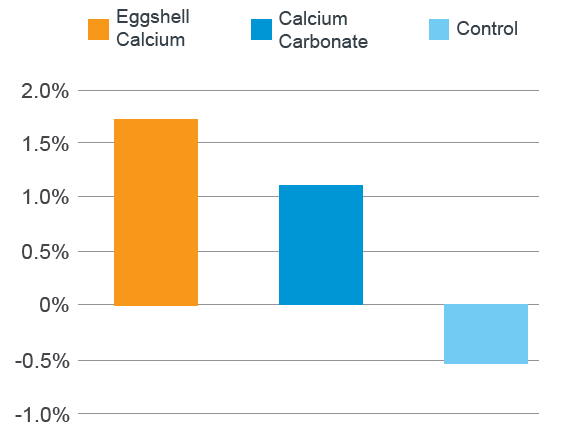Knowde Enhanced TDS
Identification & Functionality
- Chemical Family
- Ingredient Name
- Ingredient Origin
- Mineral Type
- Food Ingredients Functions
- Pharma & Nutraceuticals Functions
- Ingredients
- Egg Shell Calcium
Features & Benefits
- Labeling Claims
- Food Ingredients Features
- ESC® Standard Eggshell Calcium Overview
ESC combines ultra-pure calcium carbonate with inherent transport proteins for better absorption and essential trace minerals for supporting bone mineral density. The high elemental calcium (minimum 35%) allows for a smaller dose and greater formulation ease.
- Bone Support
- Healthy Aging
- Sports Nutrition
- Ovo-Vegetarian
Applications & Uses
- Applications
- Food & Nutrition Applications
Properties
- Appearance
- Off-white to light pink powder
- Physical Properties
- Typical Properties
- Microbiological Values
- Nutritional Information
- Specifications
- Heavy Metals
| Value | Units | Test Method / Conditions | |
| Bulk Density (loose) | min. 0.7 | g/cc | ESM-TM-PH003 |
| Bulk Density (tapped) | min.1.0 | g/cc | ESM-TM-PHO03 |
| Particle Size (Retained On #60 Mesh) | max. 5 | % | ESM-TM-PHOO2 |
| Value | Units | Test Method / Conditions | |
| Moisture Content | max. 5 | % | ESM-TM-CHOO5 |
| Value | Units | Test Method / Conditions | |
| Coliform | max. 100 | cfu/g | AOAC 991.14 or ESM-TM-MBO06 |
| Escherichia coli | Negative | /25g | USP 30 <61> or ESM-TM-MBO006 |
| Pseudomones aeruginosa | Negative | /25g | USP 30 <61> or ESM-TM-MBO06 |
| Salmonella | Negative | /25g | USP 30 <61> or ESM-TM-MBO006 |
| Staphylococcus aureus | Negative | /25g | USP 30 <61> or ESM-TM-MBO06 |
| Total Aerobic Count | max. 5,000 | cfu/g | AOAC 990.12 or ESM-TM-MBO06 |
| Yeast and Mold Count | max. 300 | cfu/g | AOAC 997.02 or ESM-TM-MBO06 |
| Value | Units | Test Method / Conditions | |
| Calcium Carbonate | min.87 | % | ESM-TM-CHO01 (USP 30) |
| Value | Units | Test Method / Conditions | |
| Elemental Calcium | min. 35 | % | ESM-TM-CHO01 |
| Value | Units | Test Method / Conditions | |
| Arsenic Content | max. 0.15 | ppm | AOAC 993.14 (ICP-MS) |
| Cadmium Content | max. 0.05 | ppm | AOAC 993.14 (ICP-MS) |
| Lead Content | max. 0.05 | ppm | AOAC 993.14 (ICP-MS) |
| Mercury Content | max. 0.05 | ppm | AOAC 993.14 (ICP-MS) |
Regulatory & Compliance
Technical Details & Test Data
- Test Data
Eggshell Calcium Increases Bone Mineral Density in Healthy Post-menopausal Women*
A randomized, double-blind, placebo-controlled human clinical trial - the gold standard of scientific research - took place over 12 months observing the long-term effects of eggshell calcium on bone mineral density. Eighty-five healthy women, 50-70 years of age who were at least 5 years post-menopausal were studied. The subjects were given either calcium carbonate or eggshell calcium, both supported with Vitamin D and Magnesium, and the effects on bone mineral density (BMD) of the femoral neck were evaluated. The published study can be found in the British Journal of Nutrition.
Figure 1. % Change in Femoral Neck Bone Density with Eggshell Calcium, Calcium Carbonate & Control

- After 12 months of supplementation, women given eggshell calcium demonstrated a significant increase in BMD of the femoral neck (Figure 1). Similar supplementation with calcium carbonate resulted in nearly a third smaller increase in BMD, while the control group actually lost BMD. The study concluded that supplementation with eggshell calcium can increase BMD of the hip within 12 months in healthy, late post-menopausal women.
- Eggshell calcium is supported by many other clinical studies, as well.
Eggshell Calcium’s Crucial Transport Proteins Enhance Absorption & Utilization in the Bones
- Two studies were conducted for seven days on 23 piglets that looked at the bioavailability of eggshell calcium in comparison with calcium carbonate (CaCO3). In addition, the influence of casein and soy protein on calcium absorption was studied. Results showed that eggshell calcium was more digestible than the calcium from purified CaCO3. In the case of casein-based protein diets, eggshell calcium was as good a source of calcium as CaCO3, and in the case of soy-based protein diets, eggshell calcium significantly outperformed CaCO3. The study concluded that eggshell calcium is a good source of calcium for growing piglets, which have similar digestive systems to humans.
- Furthermore, a separate in vitro study was conducted to evaluate calcium transport of eggshell calcium in human intestinal epithelial cells. The study found that soluble eggshell matrix proteins remarkably enhance calcium transport across Caco-2 monolayers. In the presence of whole eggshell matrix proteins, 64.3% more calcium was transported.
Packaging & Availability
- Packaging
Bulk Packaging : 20 Kg Poly-Lined Boxes
Storage & Handling
- SAMPLING & STORAGE
Recommended Retest Interval <36 MO. Reserve Sample Quantity 400 - 500 g Bulk & Sample Storage Condition 65 - 85 °C Reserve Sample Container min. 16 OZ. POLY BAG

